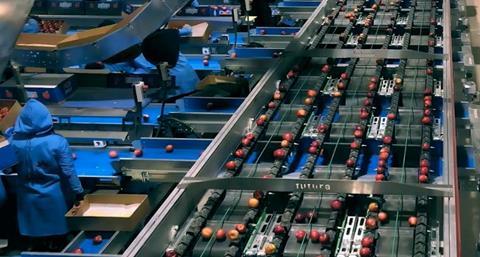
Fruitnet speaks to Omar Papi, managing director of sorting and grading technology specialist Futura, about the ongoing impact of the Covid-19 crisis.
Last year must have been a tough year for you and for your customers, is that right?
Omar Papi: It was a year full of challenges, because of the Covid-19 pandemic, but it was also a year of new developments. Companies like ours that usually export worldwide had to adapt and find new solutions – not only on a commercial level, but above all when it came to installing and starting up machinery on site, so that we continued to provide the same quality of service to which our customers are accustomed.
What impact has the pandemic had on your business?
OP: Our company has long been highly ‘digitised’ and plans all activities down to the smallest detail. Without being presumptuous, our readjustment to the new needs of the world was not as dramatic as some may think. For some time now, our technical service has been present in most of the areas in which we operate. In addition, all our systems are managed and monitored remotely with a simple internet connection, thanks to the Futura Smart Grading app.
In the second half of 2020, we created video tutorials showing how to assemble, test and use our systems. Alongside the normal technical documentation (assembly diagrams, use and maintenance manuals, etc) these new tools allow us to give local teams excellent support. In many cases, they were also a great help to our end customers, enabling them more easily to identify and solve small issues.
As a result, our service centres in countries including Russia, Uzbekistan and Iran assembled and tested new lines without particular problems. In countries without local technical assistance, installations were carried out directly by our technicians>
Every customer, anywhere in the world, is important to us. We are very proud that, even in the past year, we delivered and set up all of the systems we sold, without delay. Operating as we do in a seasonal business, this is even more important.
What about your own offer? How has this been affected?
OP: We did not postpone any of our planned technical investments, and in early 2021 our new grading and packaging lines for small fruits, such as cherries and cherry tomatoes, will be ready. When you consider that we did not tak part in the usual international fairs last year, for us it was essential to invest more in digital marketing. For example, we completely revamped our websites and social media pages, offering further technical information, brochures and videos. We also increased our presence in online trade magazines.
In which markets do you see particular growth? And in what specific product categories or market segments?
OP: Despite being a medium-sized company, a good 80 per cent of our turnover comes from foreign sales, of which at least 60 per cent are outside the EU. We have a direct presence in about 12 countries, including all of the CIS of the CIS area – Russia, Kazakhstan, Uzbekistan, Tajikistan, Azerbaijan – as well as Iran, India, Pakistan, Egypt, Kenya, South Africa, Australia and Peru.
What major challenges will your company need to tackle in 2021?
OP: First of all, I would like to underline that our entire sector can generally be satisfied with what was a strange 2020. That’s because, as we all know, some sectors have been destroyed by this pandemic.
Having said that, 2021 will not be a simple year. Our customers have to plan their purchases far in advance, because for them it’s a crucial asset. The current wave of global pessimism certainly does not help, and we are seeing many investment decisions being postponed in the near future.
Certainly, there will be new government incentives to support investment, and I hope the sector itself continues to invest. Let’s remember after all, that following every decline there is always a rise. Companies that can be ready when things start to pick up again will do much bette than others.



